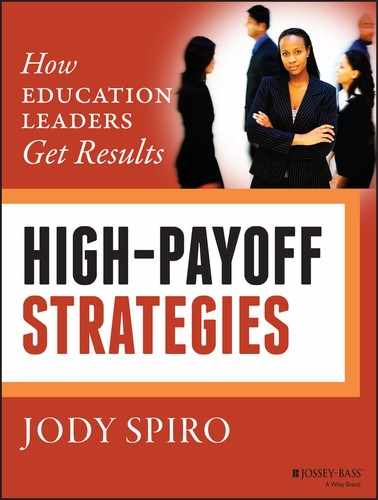Ideas for Using These Materials in Courses and Workshops
Many readers of this book provide professional development for education leaders. Here are some ideas, by topic, for that purpose. Below are suggestions that could comprise a full semester graduate course or portions thereof. Of course, any topics may be used for individual workshops.
One way to use the materials is to have the topic discussion in one session and ask participants to use the tool or exercise in-between sessions, bring back the result and discuss their experience. What follows are some discussion questions by topic:
Topic 1: The Role of Education Leaders (Chapter 1)
- Who is the most effective education leader you have worked with? Why?
- What leadership teams exist in your schools and/or districts? Who are their members? What do they do? What results have they achieved?
- Is “sharing leadership” a realistic goal? Have you seen this in action? What does it look like when done well?
- Do you agree that leadership is “second only” to teaching among school-related factors for student learning? Why or why not?
Topic 2: Change Leadership (Chapter 1)
- It has been argued that assessing “readiness” for change is an important first step, yet it is often skipped. Why do you think this happens?
- If readiness is low, should you abandon the proposed change or can you realistically improve readiness?
- Do you agree that people generally hear the need for change as “blaming”? Can you think of an example where you have experienced or observed this?
- Why is it important to consider the potential sustainability of any reform from the beginning? Have you seen this happen? What was the effect of doing so?
Topic 3: Vision and Focus (Chapter 2)
- What makes a good vision statement? What does it look like when a vision is really translated into daily operations?
- How can an effective leader facilitate others to focus on priorities? Is it realistic to remove lesser priorities from other people's plates?
- What percent of time would you estimate that you (or your principal) spend on matters directly related to improving instruction? How do you know?
- What data might tell you whether you, as leader, are sufficiently focused on your change goal?
Topic 4: Culture (Chapters 3 and 4)
- Is it a contradiction to say that culture both “evolves” and is led? Give an example of both aspects you have observed.
- Give an example you have experienced or observed of how upsetting the culture derailed something important in your school or district. Could this have been prevented? How?
- Do you agree that people's personal values play a role in the culture – even if those values have little to do with instruction-centered beliefs?
- What are the various organizational cultures at play in your school or district? Have you observed or experienced a discrepancy between or among them (perhaps creating conflicts for individuals who are members of different organizational cultures simultaneously)? How did this play out? How can a leader reconcile differences?
Topic 5: Improving Instruction (Chapters 5 and 6)
- What has been the most effective instructional improvement strategy in which you have participated? What made it so effective? How did you know?
- What strategies are most effective in supporting adults to improve their practice? How can a leader provide these supports?
- What is the role of effective teacher evaluation in improving instruction? What is the role of or on-going coaching?
- What supports can the district office provide for school leaders in improving instruction? How can the district office remove barriers?
Topic 6: Learning Communities (Chapters 7 and 8)
- What learning communities are active in your school or district? Who participates? What do they do?
- How is time found for learning communities to meet? What structures exist?
- What is the best example of a learning community in which you have participated and/or led? Why did it work so well?
- Give an example of something currently operational in the school or district that was developed by a learning community.
Topic 7: Using all Strategies Together (Chapter 9)
- In the examples from Chapter 9, how did all three high-payoff strategies work together? Give examples of each strategy and how it worked in concert with the others to achieve the result.
- Analyze a successful change in which you have participated. Were any of the high-payoff strategies in evidence? If so, what were they and how did they work together?
- Looking forward, think of a change you would like to see happen in your school or district. Which of the high-payoff strategies would you use, and how could they be sequenced?
- If you could only use one high-payoff strategy, which would it be and why?
